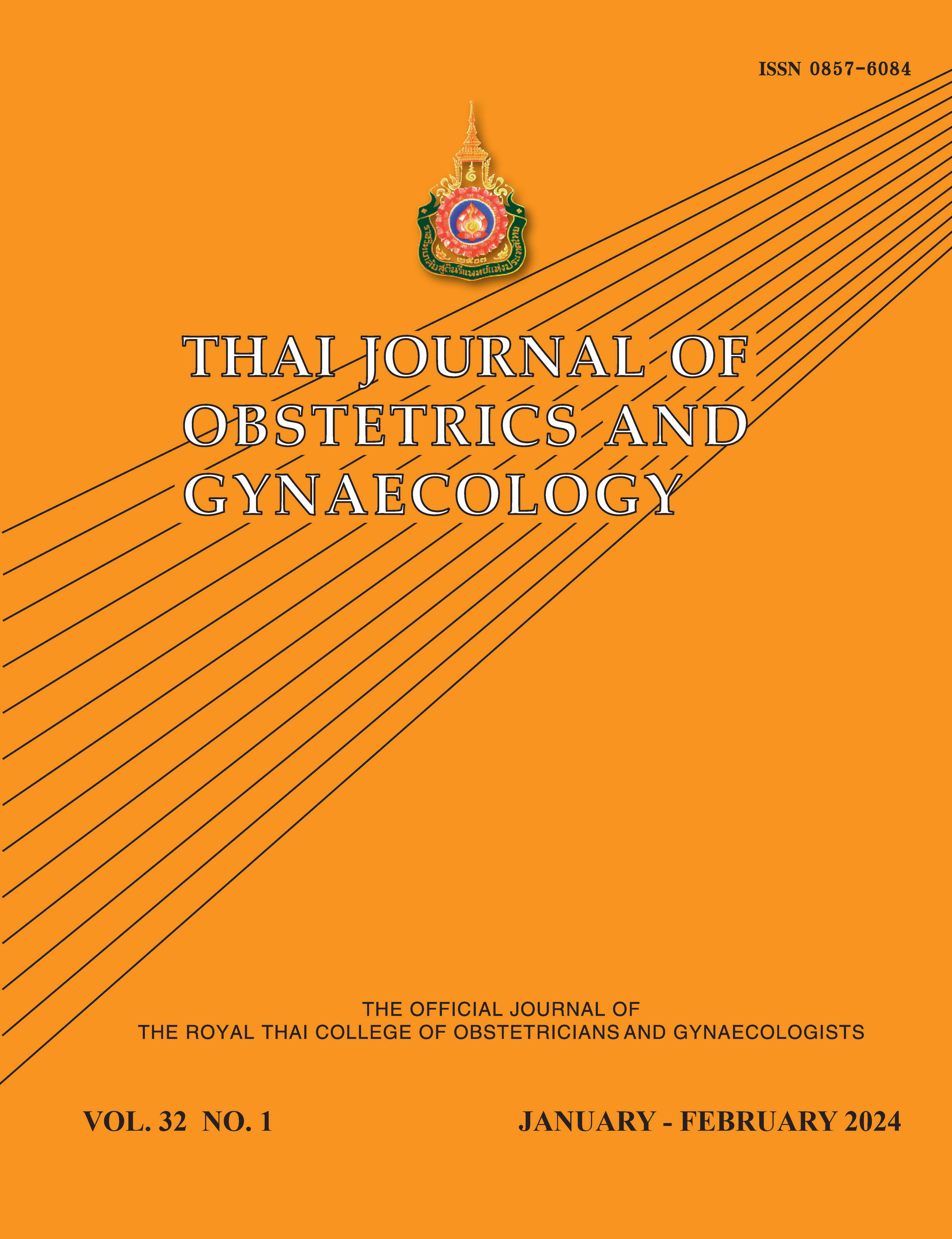Comparison between Lidocaine Spray and Cryotherapy for Pain Reduction from Amniocentesis in Second Trimester Pregnancy; A randomized controlled trial
Main Article Content
Abstract
Objectives: To compare the pain level from amniocentesis between lidocaine spray, cryotherapy prior to the procedure and control groups in second trimester pregnant women.
Materials and Methods: This was a prospective randomized-control trial study. It was conducted at Maternal and Fetal Medicine clinic at Thammasat University Hospital, Pathum Thani, Thailand between July 2021 and December 2021. Participants were pregnant women undergoing amniocentesis at gestational ages between 15 and 20 weeks. They were divided into three groups namely lidocaine, cryotherapy, and control. Subjects in lidocaine or cryotherapy groups received an administration of 8 spritzes of 10% lidocaine (80 mg) spray or cold gel packs (-18 to -24 degrees Celsius) onto the marked puncture site for five minutes before amniocentesis, respectively. The control group underwent amniocentesis in the same manner without any analgesia. Anticipated pain (Te), pain during the procedure (T0), 15 and 30 minutes after the procedure (T15 and T30) were evaluated based on 10-cm visual analog scale (VAS).
Results: A total of 330 pregnant women were recruited and allocated (110 cases per group). Mean maternal age was 36.1 years old. The demographic characters of the three groups were comparable. Pregnant women who received lidocaine had significantly less pain than control at T0, T15 and T30 (3.00 ± 2.18 vs 3.97 ± 2.27, p = 0.001, 0.95 ± 1.41 vs 1.95 ± 1.75, p < 0.001, 0.48 ± 1.11 vs 0.95 ± 1.28, p = 0.004, respectively). Those who received cryotherapy had significantly less pain than control at T0 and T15 (3.39 ± 1.84 vs 3.97 ± 2.27, p = 0.038 and 1.48 ± 1.49 vs 1.95 ± 1.75, p = 0.032, respectively). Lidocaine had less pain level than cryotherapy group at T15 and T30 (0.95 ± 1.41 vs 1.48 ± 1.49, p = 0.008 and 0.48 ± 1.11 vs 0.93 ± 1.20, p = 0.005, respectively).
Conclusion: Participants in both the lidocaine spray and cryotherapy groups had comparable pain levels during the procedure. In contrast, at 15 and 30 minutes after the procedure, the lidocaine spray group had less pain than the cryotherapy group.
Article Details

This work is licensed under a Creative Commons Attribution-NonCommercial-NoDerivatives 4.0 International License.
References
Cunningham FG, Lenovo KJ, editors. Williams Obstetrics. 26th ed. New York: McGraw-Hill Education 2022:332-51.
Suntornlimsiri W, Naunkeaw K. Clinical correlates of pain with second-trimester genetic amniocentesis. J Med Assoc Thai 2009;92:1567-72.
Derry S, Moore RA. Topical lidocaine for neuropathic pain in adults. Cochrane Database Syst Rev 2014;2014:CD010958.
Oliveira SM, Silva FM, Riesco ML, Latorre Mdo R, Nobre MR. Comparison of application times for ice packs used to relieve perineal pain after normal birth: a randomised clinical trial. J Clin Nurs 2012; 21: 3382-91.
Homkrun P, Tongsong T, Srisupundit K. Effect of Xylocaine spray for analgesia during amniocentesis: a randomized controlled trial. Prenat Diagn 2019;39: 1179-83.
Benchahong S, Pongrojpaw D, Chanthasenanont A, Limpivest U, Nanthakomon T, Lertvutivivat S, et al. Cold therapy for pain relief during and after amniocentesis procedure: A randomized controlled trial. J Obstet Gynaecol Res 2021;47:2623-31.
Hanprasertpong T, Kor-Anantakul O, Prasartwanakit V, Leetanaporn R, Suntharasaj T, Suwanrath C. Efficacy of cryoanalgesia in decreasing pain during second trimester genetic amniocentesis: a randomized trial. Arch Gynecol Obstet 2012;286:563-6.
Gordon MC, Ventura-Braswell A, Higby K, Ward JA. Does local anesthesia decrease pain perception in women undergoing amniocentesis? Am J Obstet Gynecol 2007;196:55.e1-4.
Wax JR, Pinette MG, Carpenter M, Chard R, Blackstone J, Cartin A. Reducing pain with genetic amniocentesis-A randomized trial of subfreezing versus room temperature needles. J Matern Fetal Neonatal Med 2005;18:221-4.
Pongrojpaw D, Somprasit C, Chanthasenanont A. The efficacy of lidocaine-prilocaine cream to reduce pain in genetic amniocentesis. J Med Assoc Thai 2007;90: 1992-6.
Elimian A, Goodman JR, Knudtson E, Wagner A, Wilson P, Williams M. Local anesthesia and pain perception during amniocentesis: a randomized double blind placebo-controlled trial. Prenat Diagn 2013; 33:1158-61.
Telapol K, Bumrungphuet S, Israngura Na Ayudhya N. Effect of ethyl chloride spray for pain reduction during amniocentesis: A non-blinded randomized controlled trial. Thai J Obstet Gynaecol 2018;26:75-82.


